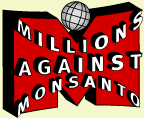 Monsanto’s Roundup Triggers Over 40 Plant Diseases and Endangers Human and Animal Health
Monsanto’s Roundup Triggers Over 40 Plant Diseases and Endangers Human and Animal HealthFor over 20 years, Don studied Roundup’s active ingredient glyphosate. He’s one of the world’s experts. And he can rattle off study after study that eliminate any doubt that glyphosate is contributing not only to the huge increase in SDS, but to the outbreak of numerous other diseases.
More than 30% of all herbicides sprayed anywhere contain glyphosate—the world’s bestselling weed killer. It was patented by Monsanto for use in their Roundup brand, which became more popular when they introduced “Roundup Ready” crops starting in 1996. These genetically modified (GM) plants, which now include soy, corn, cotton, canola, and sugar beets, have inserted genetic material from viruses and bacteria that allows the crops to withstand applications of normally deadly Roundup.
But Fusarium’s wrath is not limited to plants. According to a report by the UN Food and Agriculture Organization, toxins from Fusarium on various types of food crops have been associated with disease outbreaks throughout history.
They’ve “been linked to the plague epidemics” of medieval Europe, “large-scale human toxicosis in Eastern Europe,” oesophageal cancer in southern Africa and parts of China, joint diseases in Asia and southern Africa, and a blood disorder in Russia. Fusarium toxins have also been shown to cause animal diseases and induce infertility.Glyphosate can attack from above and below. It can drift over from a neighbors farm and wreak havoc. And it can even be released from dying weeds, travel through the soil, and then be taken up by healthy crops.
Add this threat to the already high glyphosate residues inside our own diets due to corn and soybeans, and we have yet another serious problem threatening our health. Glyphosate has been linked to sterility, hormone disruption, abnormal and lower sperm counts, miscarriages, placental cell death, birth defects, and cancer, to name a few. (See resource list on glyphosate health effects.)
 The same nutrients that glyphosate chelates and deprives plants are also vital for human and animal health. These include iron, zinc, copper, manganese, magnesium, calcium, boron, and others. Deficiencies of these elements in our diets, alone or in combination, are known to interfere with vital enzyme systems and cause a long list of disorders and diseases.
The same nutrients that glyphosate chelates and deprives plants are also vital for human and animal health. These include iron, zinc, copper, manganese, magnesium, calcium, boron, and others. Deficiencies of these elements in our diets, alone or in combination, are known to interfere with vital enzyme systems and cause a long list of disorders and diseases. Alzheimer’s, for example, is linked with reduced copper and magnesium. Don Huber points out that this disease has jumped 9000% since 1990.Veterinarians who started their practice after GMOs were introduced in 1996 might assume that many chronic or acute animal disorders are common and to be expected. But several older vets have stated flat out that animals have gotten much sicker since GMOs came on the scene. And when they switch livestock from GMO to non-GMO feed, the improvement in health is dramatic. Unfortunately, no one is tracking this, nor is anyone looking at the impacts of consuming milk and meat from GM-fed animals.
And “Fusarium is a very serious pathogen of alfalfa,” says Don. “So too are Phytophthora and Pythium,” both of which are promoted by glyphosate. “Why would you even consider jeopardizing the productivity and nutrient quality of the third most valuable crop in the US?” he asks in frustration, “especially since we have no way of removing the gene once it is spread throughout the alfalfa gene pool.”
Instead, the USDA largely marches lock-step with the biotech industry and turns a blind eye to the widespread harm that Roundup is already inflicting. If they decide to approve Monsanto’s alfalfa, the USDA may ultimately be blamed for a catastrophe of epic proportions.
Please send a letter to USDA Secretary Tom Vilsack, urging him not to approve Roundup Ready alfalfa, and to fully investigate the damage that Roundup and GMOs are already inflicting.


No comments:
Post a Comment